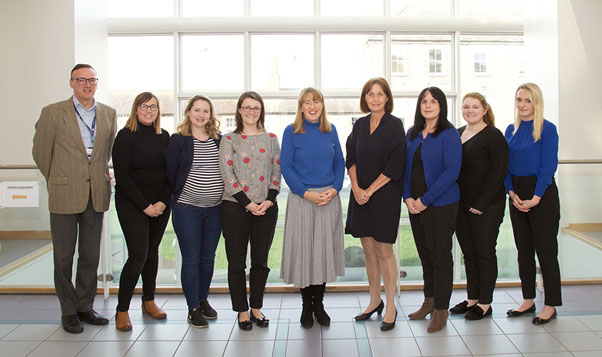For 21-year-old Shauntelle Tynan, exercise isn’t simply a task to pencil in as a New Year’s resolution or an excuse to search out eye-candy in the gym as it is for so many of us. As a cancer survivor from Carlow, for Shauntelle, exercise has been integral to her treatment and recovery.
After her experience wIth a rare form of cancer, Shauntelle believes that a change in exercise programmes is integral in the improvement of cancer treatment and rehabilitation. It is universally known that exercise reduces the risk of cancer development, but moreover, physical activity also aids cancer treatment, and reduces overall recovery time post-treatment. With the probability being that one in every two of us will be diagnosed with a form of cancer in our lifetime, it is incredible to note that approximately 65% of Irish people don’t engage in enough exercise.
Incidence of cancer is growing, as we heighten our chances of tumour development through our deliberate exposure to carcinogens through consumption of alcohol, poor diet, and smoking. Moreover, with the field of research ever-growing and new therapies now emerging, the chance of survivorship is on the rise.
Shauntelle Tynan is now one year cancer free, after battling a rare type called Histiocytosis X. This form affected her gastro-intestinal tract most severely, and as there are only 16 cases of this cancer ever documented in Ireland due to its infrequency, she was forced to find help elsewhere. After a public outcry for funds to aid her treatment in Houston, Texas, she raised over €600,000 on her GoFundMe page, and received the necessary help to overcome the disease. In speaking to Shauntelle on the necessity that is exercise integration in cancer treatment, she explained: “Getting up and being active throughout chemotherapy helps to distract you but also builds your strength up after losing so much from treatment…the doctors really expressed the importance of exercising through chemo and trying to do as much as I could.”
Although her exercise plans were not specific to her, she emphasises how as a recovered patient she saw the need for specialised intervention in exercise programmes. “Every patient is different, the dosages and type and stage of chemotherapy and illness varies from patient to patient, so I definitely think that patients could benefit from an individual and personal exercise plan.”
“Getting up and being active throughout chemotherapy helps to distract you but also builds your strength up after losing so much from treatment”
With an increased population of cancer survivors, who have both physical and physiological needs in order to restore well-being, intervention through exercise programmes is needed to optimise quality of life. Dr. Juliette Hussey is a researcher in the School of Medicine in Trinity whose area of focus is exercise in the management and prevention of disease. Speaking with her on rehabilitation programmes after cancer treatment, she explains: “Cancer treatment has made huge improvements over the past years. There is a need to keep up with the rising levels of survivorship, by developing programmes specific to patient needs.”
Exercise rehabilitation is a care strategy with considerable potential to optimise physical function and quality of life in cancer survivorship. How does exercise optimise the response to cancer treatment,and generally reduce patient recovery time? In 2017, Dr. Hussey and a number of other professors in Trinity including Dr. Luke O’Neill explored the already established basis that carcinogens and obesity-associated inflammation are linked to the overproduction of cytokines and chemokines in tumour development. Their research explored how increased exercise can lead to a reduction in chemokine production, and in turn attenuates some of the negative consequences and optimises survivorship in cancer patients.
Following on from this, it was evident that extended research into the benefits of physical activity in helping surviving patients was needed. Dr. Hussey received €1.4 million in grant funding in 2018 from the Health Research Board and Irish Cancer Society to aid her work to investigate the need for exercise programmes in order to optimise therapeutic response during treatment, prevent the occurrence of secondary diseases post treatment, and to restore quality of life to the level post diagnosis. Her research emphasises the need for the development of specific exercise programmes based on individual patients.
The root of inspiration for Dr. Hussey to start her current research came after her work with PhD student at the time Dr. Jenny Gannon. They portrayed how survivors of esophageal cancer treatment demonstrated a significant compromise in physical functioning post treatment. This highlighted the multiple, complex needs of surviving invasive disease patients: “If we increase the fitness of patients with cancer, we would be able to reduce the number of complications, improve their recovery, and reduce the length of hospital stay.”
Traditionally, as with Shauntelle’s exercise programmes, general rehabilitation strategies are followed. However, through Dr. Hussey’s work she explores the need for both specific rehabilitation and prehabilitation programmes to be put in place for the increasing numbers of cancer survivors. The research aims to evaluate the benefits of individual exercise prescriptions for cancer patients, based on their form of cancer, and on the basis of their specially tailored treatment. “Programmes have to be individual due to differing aerobic capacity and different fitness from one patient to the other, all of these things need to be taken into account.” She expressed the need for high interval intense training so that fitness can be gained over a shorter period of time, as new therapies and drugs come into play.
Dr. Hussey aims to focus her research over the next four years specifically on supporting the guidelines for rehabilitation for individual exercise prescription for patients with gastro-intestinal cancer. Her focus is also set on the support of prehabilitation programmes for patients facing esophageal or lung resection. With 40,000 new cases of cancer diagnosed each year in Ireland, further research into methods of effectively restoring patient quality of life through rehabilitation post treatment is essential.






